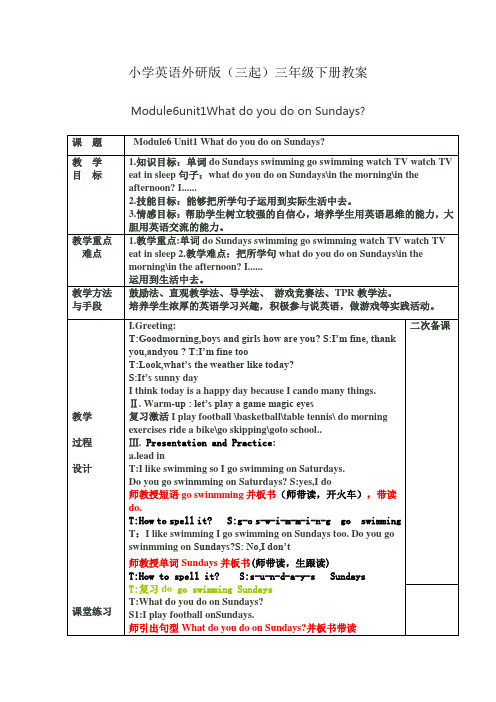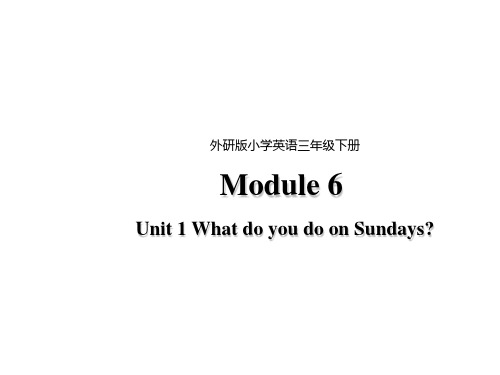【优质】小学英语外研版三年级下册Module 6 Unit 1 What do you do on Sundays 优质公开课教案1
- 格式:doc
- 大小:27.00 KB
- 文档页数:3


外研版小学英语(三年级起点)三年级下册Module 6Unit 1 What do you do on Sundays?第一课时一、教学内容本课教学内容是外研版小学英语(三年级起点)三年级下册Module 6Unit 1 What do you do on Sundays?本单元话题是谈论周日活动安排。
主课文语境是星期日下午,Sam 在去踢足球的路上遇到了Dalin,两人一边走一边谈论各自在星期日的活动安排。
二、学情分析三、本课的教学对象是三年级的学生,他们活泼好动,喜欢模仿,唱歌,游戏,也喜欢各种各样的活动。
第四模块已经学了I like swimming/football/riding my bike等句型,第五模块已学过用She/He plays football/goes to school/goes to work/goesshopping Do you play football on Saturdays ? yes, I do ./No I don’t.来谈论自己周六的活动。
这些都为本单元以旧引新谈论周日活动安排,打下了基础。
三、课时安排:两课时第一课时:讨论图片,预测文本信息;阅读文本,完成语篇信息采集任务,感知新语言知识。
第一课时【教学目标】知识目标:要求学会的单词on Sundays、go swimming、eat、sleep、watch TV,能够灵活运用句子What do you do on Sundays ?和What do you do in the morning/afternoon?及做出相应的回答。
能力目标:学会询问他人的周末活动,回答他人对自己周末活动的询问。
情感目标:让学生拥有一个健康向上的周末活动,通过学生小组合作、讨论、交流,让学生感受把所学知识融会到实际交往中的乐趣,培养学生浓厚的英语兴趣,从而激发积极的学习情感。
【教学重点】教学重点:单词:Sunday、go swimming、eat、sleep、watch TV 句子:What do you do on Sundays?What do you do in the morning/afternoon?【教学难点】运用What do you do on Sundays ?和What do you do in the morning/afternoon?把所学知识融入到实际交往中。


Module 6 Unit 1 What do you do on Sundays? 教学设计
(1) What do Mum and Dad do on Mondays?
(1) They go to work on Mondays.
原来,通常爸爸妈妈周一会去上班。
同学们你们回答对了
吗?
(2) What does my sister do on Mondays?
(2)My sister also goes to school on Mondays.
通常我的妹妹周一也去上学。
你们回答对了吗?
2.[Listen, point and say]
教师组织学生观看动画:“同学们掌握得真棒!
Let’s watch a video. What does the dog do on
Mondays? What activities can you hear?
好奇的小猫很想知道小狗周一会做什么呢?请
同学们认真看动画,然后用英文告诉可爱的小猫
吧!
原来,小狗每周一都会吃肉(eat meat),你们回答对了
吗?
教师总结对话中出现的go swimming, ride a bike,
eat meat, 并让学生重复。
教师引导学生为对话配音:“I am the cat. Who
would like to be the dog? Now let’s role-play.”
二、新知呈现 1. 学生带着问题观看动画, 1. Listen, point and find “What do you do…?”引导学生呈现情境,观看。


Module 6 ActivitiesUnit 1 What do you do at the weekend?一、Warming up: 1. Greeting:T: Hello, boys and girls. Let us recite the seasons. Ok?Ss: Ok.T and Ss: spring, summer, autumn and winter.T: What day is it today?Ss: Today is ……2. Saying a chant:Hello, Meg, hello, Ted.What’s his name? He is Ben.What’s her name? She is Pat.How old is she? She is eight.How old is he? He is nine.3. Singing “Head, shoulders, knees and toes.二、New concept.T: Oh, you are great .Today let us learnModule 6ActivitiesUnit 1 What do you do at the weekend? (Writing and reading)1. T: Do you like playing football?Ss: Yes, I do.T: What do you do at the weekend? (explain in Chinese )Ss: I play basketball.T: I like reading at the weekend .What about you?Ss: I like swimming.T: You are great.T: And what do you have at school?You can say: I have ……Ss: I have English and Chinese.T: Do you like maths?Ss: Yes, I do. / (No, I don’t.)T: What do you do at 5 o’clock in the morning?I sleep in the morning. What about you?Ss: I sleep too.2. Do exercises: On the board write the following list1) What do you do at the weekend?I………..2) What do you have at school?I have …… and ……3. Listen and say. Play the tape, pause it after each utterance and let the Ss repeat the sentences.4. Show the Ss some books .For example “Maths”“Chinese”“Science”Show the Ss some pictures “football”“sleep”“swimming5. Text 1) Listen and look.2) Answer questions:What do you do at ……o’clock in the morning?What do you have at school?三、Homework: 1) Read the text frequently and recite the text.2) Copy the following sentences 2 times.What do you do at the weekend?What do you have at school?。
外研版小学英语三年级第二册Module6Unit1教材内容全解Module6Unit1教材内容全解Module6 Unit1 What do you do on Sundays?你在星期日做什么?1.Listen,point and say.听一听,指一指,说一说。
【课文全译】Hello! 你好!Hi! 你好!Do you go swimming on Mondays? 你在星期一去游泳吗?No,I don’t. 不,我不去。
Do you ride a bike on Mondays? 你在星期一骑自行车吗?No,I don’t. 不,我不骑。
What do you do on Mondays? 你在星期一做什么?I eat meat。
Ha Ha…我吃肉。
哈哈……Oh no! 哦,不!【课文注解】①do(实义动词)做,干,形近词go“去,到”,第三人称单数形式does,现在分词doing;do还作助动词,在句中帮助构成否定句(I don’t do my homework on Saturdays.)或一般疑问句(Do you like meat?Yes,I do./No,I don’t.),课文中What do you do on Mondays?第一个do是助动词,无实在意义,只是帮助构成一般疑问句,而第二个do是实义动词,意为“做,干”。
例句:——Do you ride a bike on Mondays?你星期一骑自行车吗?——Yes,I do./No,I don’t.是的,我骑自行车。
/不,我不骑自行车。
——What do you do after school?放学后你做什么?——I do my homework.我做我的家庭作业。
I will do my homework at 8:00.我八点钟做家庭作业。
②eat(动词)吃,近音词it,第三人称单数形式eats,现在分词eating,短语eat up吃光,drink喝,英语中“吃,喝”可以用have表示(have breakfast,have meat,have some milk,have tea),例句:——What do you want to eat?你想吃点什么?——I want to eat an apple.我想要吃一个苹果。
三年级下册英语教案-Module6 Unit1 What do you do onSunday∣外研社(三起)一、教学目标知识目标:1.掌握以下词汇:weekday, weekend, play the guitar, draw pictures, watch TV, feed the dog, visit grandparents。
2.理解并能运用以下句型:What do you do on weekdays/weekends? I play the guitar on weekends.能力目标:1.通过对话和游戏等形式,培养学生口语表达能力。
2.通过对词汇和句型的学习,提高学生听、说、读、写的综合技能。
情感目标:1.培养孩子们爱好读书、学习的兴趣和习惯。
2.让学生明白平时的生活和周末时间是需要好好安排和利用的。
二、教学重点1.词汇的认读和理解。
2.句型“What do you do on weekdays/weekends? I … onweekdays/weekends.”的运用。
三、教学难点1.句型“What do you do on weekdays/weekends? I … onweekda ys/weekends.”的运用。
2.对于游戏等形式的活动,理解和口齿表达的能力。
四、教学方法1.情境教学法2.活动教学法3.彩绘教学法4.游戏教学法五、教学过程1. Warming up1.Greet the students and ask them about their weekends.2.Ask students to stand up and stretch their arms and legs, then sit down and get ready for the class.2. Presentation1.Ask students to look at the pictures on page 44 of the textbook and tell the teacher what they see.e the attached flashcards to teach the words “weekday”, “weekend”, “play the guitar”, “draw pictures”, “watch TV”, “feed the dog”, and “visit grandparents”.3.Ask students to repeat the words after the teacher and identify the words’ meanings using the pictures.3. Practice1.Show the students a flashcard and ask, “What do you do on weekdays/weekends?” Students can answer with actions such as “I st udy on weekdays.” or “I play with my friends on weekends.” Repeat to practice the sentence structure and help students remember the vocabulary.2.Play a game called “What I like to do” where students write in a blank space what they enjoy doing in their free time, then read it aloud to the class. Afterwards, ask students to stand up and read out their classmates’ hobbies with actions.3.Divide the class into small groups and ask them to use the given vocabulary to create a story about what they did on the weekend. Afterwards, a representative from each group shares their story with the whole class.4. Production1.Ask students to work in pairs and practice the sentence structure “What do you do on weekdays/weekends? I … on weekdays/weekends.” and use the given vocabulary words to make sentences.2.Have the students fill out a worksheet with pictures of each of the new words and they must write sentences using the sentence structure taught in class.3.The students are to draw a picture of what they like to do ontheir weekends and share it with the class.5. Consolidation1.Review the new words, sentence structure, and the pupils’ production.2.Call on a couple of students to share one thing they learned today.3.End the lesson by telling the students the importance of using free time wisely.六、Homework1.Review the vocabulary and sentence structure taught in today’s class.2.Share with parents what we learned today and ask them to share their favorite activity with the student.3.Draw a picture of the favorite activity shared by their parents.七、Blackboard design1.Vocabulary: weekday, weekend, play the guitar, draw pictures, watch TV, feed the dog, visit grandparents。
Module 6 Unit 1 What do you do on Sundays 教案1
教学目标
(1)询问他人的在学习上的课程;回答他人对自己所上课程的询问:What do you have at school?
I have English / English/ Maths / Science.
(2)询问他人的周末活动;回答他人对自己周末活动的询问: What do you do at the weekend?
I go swimming / play football / sleep.
教学重点与难点
教学重点:
能询问他人的学校课程及周末活动;能回答他人对自己所上课程及周末活动的询问。
教学难点:
能较熟练地运用新学的单词和句子对课程和周末活动进行问答。
教学准备及手段
复读机、配套磁带、录音磁带、卡片、课程评价表和星星、课本(语文、数学、英语和科学)。
教学流程
一、组织引入:
1、Greeting.
2、出示课程评价表,说明使用方法
二、新知学习
1、句子What do you have at school? I have...的学习活动:
①学说What do you have at school? I have English.(动作节奏、实物)
②学说Maths, Science, Chinese,并用实物(课本)引入句子。
③开火车。
④同时出示两本课本让学生自己说出句子,chant。
⑤学生小组进行轮流问答操练。
⑥小组挑战赛:教师示范,小组挑战,并评价。
活动要求:每组请一名同学出示课本全组齐问另一个组的同学,然后根据这个组同学的回答给与评价(应该获得小星星还是大星星)。
2、句子What do you do at the weekend? I ...的学习活动:
①What do you do at the weekend? I go swimming.(动作节奏)
②学说sleep, play football,教师引导学生把单词加上动作带入句子中进行操练。
当问答到play football的时候教师反问:Do you play football in the morning?引导学生回答Yes, I do. / No, I don't.
③Chant.
④听音练习:从原来的学校给学生带来了3年1班同学的礼物(对话录音),学生们收礼物。
听音理解,开拓学生思维,说说自己周末还做些什么。
⑤回赠礼物:选出表现优秀好的学生负责送礼物。
a. 示范
b. 请几位位小记者采访其他同学,小记者选出采访中表现最好的同学,把手中的幸运星发给他/她。
c.录音:全班问,得到幸运星的同学回答。
3、活动一:Listen point and repeat.
三、布置任务:为下一课的学习收集资料(时间充足课堂上学生完成任务,时间不够作为课后任务。
)。